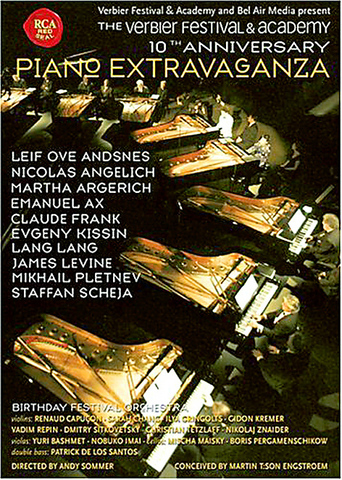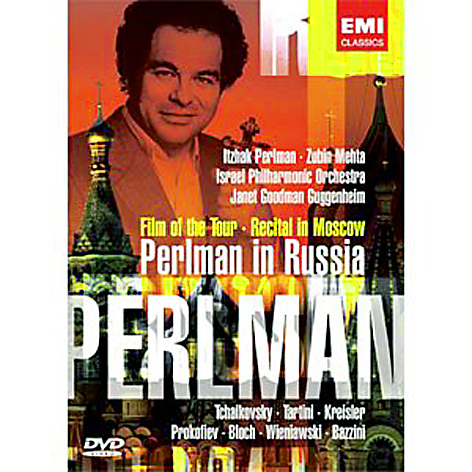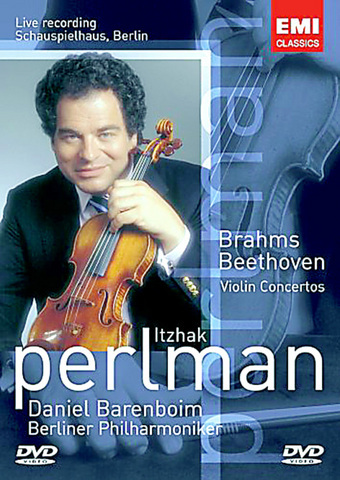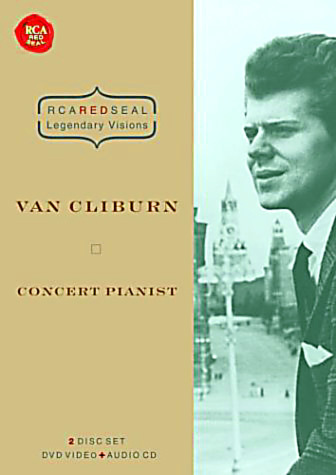The DVD I enjoyed most this month was Sony BMG Van Cliburn, Concert Pianist, a US TV film, narrated by Dan Rather, about the 1.93m Texan who in 1958 won the International Tchaikovsky Competition at the age of 23. It was the height of the Cold War, and a committee of commissars had tried to bar him from victory in favor of someone Russian. "Is he the best?" asked Soviet leader Nikita Khrushchev. "Then give it to him." He was presented the gold medal by Dmitri Shostakovich.
Van Cliburn's fame may have been partly political -- he played in the White House for every US president from Eisenhower to Reagan, and yet always said how much he loved both Russian culture and the Russian people. But what comes over on this film is his artistry, and how that preserved, even created, a lifeline between two great peoples when their hostility and rivalry could well have annihilated all life on the planet. This very moving DVD, which has the option of Japanese subtitles, comes with a CD of Cliburn playing in full some of the items featured in the movie.
Eight of the most famous pianists alive performing Richard Wagner's The Ride of the Valkyries on eight Steinway grand pianos in a tent in the Swiss Alps is surely an unusual spectacle. It's surprisingly almost enjoyable as well, and definitely instructive with regard to the music's inner structure.

Martha Argerich, James Levine, Evgeny Kissin, Gidon Kremer, Mischa Maisky, Mikhail Pletnev, Emanuel Ax, Lang Lang and Sarah Chang -- the annual summer Verbier Festival manages to attract just about every classical celebrity. All of the above and more feature on the event's 10th Anniversary Piano Extravaganza, a DVD which has as its climax eight of them playing a Steinway piece simultaneously. As well as the Wagner, they also play a version of Gioachino Rossini's Semiradime overture and, just to show how serious the whole enterprise is, The Stars and Stripes Forever.
As Levine explains on the bonus feature, almost all the great composers created transcriptions for piano of their most popular orchestral works. These were made for domestic use by amateurs, but these days such things have fallen out of fashion. A few are resurrected here, however, and others were made specially to celebrate the festival's 10th birthday in 2003. And a line-up of some of the best-paid classical artists alive playing Happy Birthday to You is surely destined to become a popular track to accompany the cutting of the cake at many a birthday celebration.
There are times, it's true, when it seems as if the organizers have the Guinness Book of Records in mind rather than musical quality, and Levine himself refers to the problems of coordination in an eight-piano situation. But there are some serious items too. Martha Argerich (absent from the eight-pianist extravaganza) playing a Mozart piano sonata for four hands with Evgeny Kissin, and a JS Bach concerto for four pianos, are the musical highlights of this DVD.

For the rest, it's rather akin to a Three Tenors concert -- some of the participants must have been asking themselves why on earth they were doing it at all. Levine anticipates such skepticism by saying on camera that it was essentially fun to do, and hopes it was fun to listen to as well.
One of the advantages of the proliferation of DVDs featuring classical music is that you quickly get to know the major personalities of the music world. Figures who were merely names on CDs become recognizable people, albeit sometimes as they looked ten or more years ago. The reason for the time lapse is that there is a huge backlog of musical performances on video that are now being transferred onto the much more convenient DVD format.
Thus it is that EMI has just released three DVDs of Itzhak Perlman dating from the early 1990s. Perlman in Russia contains two disks. One is a documentary on his 1990 trip, in which we see him talking to Jewish figures (and hearing the opinion that four out of five of them wanted to emigrate to Israel), and visiting a center where people with disabilities similar to his own receive treatment that can't compare with what he's able to get in the US. We also learn that the violin he plays used to belong to Yehudi Menuhin. The second DVD shows a Moscow recital with pianist Janet Goodman Guggenheim.

Perlman's trip to Russia was particularly significant because he went there with the Israel Philharmonic Orchestra, and a visit a decade earlier had been canceled at the last moment by the then Soviet authorities. Russian anti-Semitism, including earlier government anti-Semitism, in other words, formed the background to the entire visit, and made the rapturous reception the musicians received all the more gratifying.
A separate item, Beethoven, Brahms: Violin Concertos, is of a 1992 concert in Berlin with the Berlin Philharmonic under Daniel Barenboim. These are much-recorded works, but high sound quality on this DVD is particularly remarkable. Both of these Perlman products contain electronic booklets accessable via a DVD-ROM drive and Adobe Acrobat Reader 6.0.


The unexpected collapse of the recall campaigns is being viewed through many lenses, most of them skewed and self-absorbed. The international media unsurprisingly focuses on what they perceive as the message that Taiwanese voters were sending in the failure of the mass recall, especially to China, the US and to friendly Western nations. This made some sense prior to early last month. One of the main arguments used by recall campaigners for recalling Chinese Nationalist Party (KMT) lawmakers was that they were too pro-China, and by extension not to be trusted with defending the nation. Also by extension, that argument could be

Aug. 4 to Aug. 10 When Coca-Cola finally pushed its way into Taiwan’s market in 1968, it allegedly vowed to wipe out its major domestic rival Hey Song within five years. But Hey Song, which began as a manual operation in a family cow shed in 1925, had proven its resilience, surviving numerous setbacks — including the loss of autonomy and nearly all its assets due to the Japanese colonial government’s wartime economic policy. By the 1960s, Hey Song had risen to the top of Taiwan’s beverage industry. This success was driven not only by president Chang Wen-chi’s

Last week, on the heels of the recall election that turned out so badly for Taiwan, came the news that US President Donald Trump had blocked the transit of President William Lai (賴清德) through the US on his way to Latin America. A few days later the international media reported that in June a scheduled visit by Minister of National Defense Wellington Koo (顧立雄) for high level meetings was canceled by the US after China’s President Xi Jinping (習近平) asked Trump to curb US engagement with Taiwan during a June phone call. The cancellation of Lai’s transit was a gaudy

The centuries-old fiery Chinese spirit baijiu (白酒), long associated with business dinners, is being reshaped to appeal to younger generations as its makers adapt to changing times. Mostly distilled from sorghum, the clear but pungent liquor contains as much as 60 percent alcohol. It’s the usual choice for toasts of gan bei (乾杯), the Chinese expression for bottoms up, and raucous drinking games. “If you like to drink spirits and you’ve never had baijiu, it’s kind of like eating noodles but you’ve never had spaghetti,” said Jim Boyce, a Canadian writer and wine expert who founded World Baijiu Day a decade